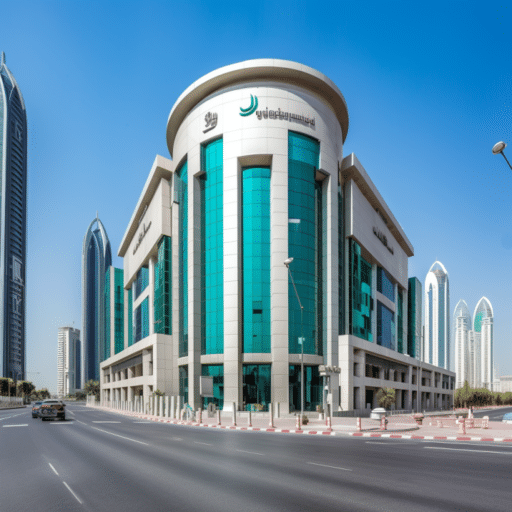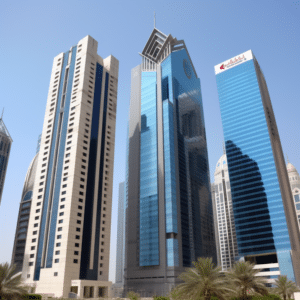Learn about the American banks in Dubai and why they might not be the best investment consultants for your needs.
Dubai stands tall as a global financial hub, drawing expatriates from all corners of the world, especially Americans.
The presence of American banks in Dubai, such as Citibank, which opened its first branch in Dubai in 1964, followed by Abu Dhabi in 1971, provides a comforting familiarity to these expats. But is familiarity the only criterion you should base your banking decisions on?
The current landscape shows that there are approximately 40,000 Americans residing in Dubai. With such a significant American population, it’s no surprise that American banks in Dubai have tried to cater to this demographic.
However, the banking ecosystem in Dubai is vast and diverse, with local banks like Mashreq, which has been one of the UAE’s top-performing banks for over five decades, and Emirates NBD, a key player in the global digital banking industry, holding 97% of all financial transactions digitally.
Moreover, international banks, such as J.P. Morgan, have also expanded their footprint in the region. J.P. Morgan opened an office in Dubai in 2007, incorporating various sectors like Investment Bank, Private Bank, and Treasury & Securities Services.
This expansion signifies the importance and potential of the Dubai market.
While American banks in Dubai have a storied history and a robust presence, it’s essential to evaluate if they align with your specific needs, especially in a dynamic environment like Dubai.
The city’s banking sector is not just about American banks; it’s a blend of local expertise, international standards, and innovative financial solutions.
If you want to invest as an expat or high-net-worth individual, you can email me (advice@adamfayed.com) or use these contact options.

The Landscape of American Banks in Dubai
Overview of American Banks in Dubai
American banks in Dubai, such as Citibank, JP Morgan, and Bank of America, have marked their territory in this financial hub.
With branches strategically located across the city, they cater to a diverse clientele, from expatriates seeking the comfort of familiar banking services to businesses requiring robust financial solutions.
Citibank, for instance, initiated its journey in the United Arab Emirates in 1964, opening its first branch in Dubai and subsequently in Abu Dhabi in 1971 source.
While the presence of American banks in Dubai offers a semblance of home to many, it’s crucial to grasp their role within the broader UAE banking ecosystem.
The Relationship between the US and UAE Banking Systems
The banking framework within which American banks in Dubai operate is a blend of both US and UAE regulations. This collaboration between the regulatory bodies of the two nations ensures that American banks in Dubai consistently meet international standards.
The economic ties and trade relations between the US and UAE further strengthen the position of American banks in Dubai.
For example, interbank rates have witnessed a rise of more than 400bp this year, and a majority of the large UAE banks, including American ones, primarily depend on net interest income for revenue generation source..
Challenges and Opportunities in the Banking Sector
While American banks in Dubai enjoy a robust presence, they also face challenges. Asset quality metrics, for instance, showed a moderate deterioration by the end of the third quarter of 2020.
The average Stage 3 loans ratio stood at 5.6%, up from 4.4% at the end of 2019 source. Such challenges necessitate that American banks in Dubai continually adapt and innovate.
Technological Advancements and Digital Banking
The banking sector in the UAE, including American banks in Dubai, is rapidly embracing technology. Digital banking solutions, online platforms, and mobile apps are becoming the norm, enhancing customer experience and ensuring efficient service delivery.
Sustainable Banking Practices
Sustainability is becoming a focal point for many banks in the region. American banks in Dubai are increasingly integrating sustainable practices into their operations, focusing on green financing, supporting eco-friendly projects, and promoting responsible banking.
Expanding Services and Products
To cater to the diverse needs of their clientele, American banks in Dubai are continually expanding their range of services and products. From personal loans to investment solutions, they strive to offer comprehensive financial solutions to both individuals and businesses.
Why Considering Alternatives is Prudent
The financial landscape of Dubai, known for its dynamic and diverse banking sector, offers a myriad of options for both residents and expatriates. While American banks in Dubai present a familiar face to many, it’s essential to scrutinize their offerings against the backdrop of local alternatives.
The decision of where to bank can have long-term implications on your financial health, especially when it comes to service charges and fees.
1. Higher Service Charges and Fees
The Cost of Familiarity
American banks in Dubai, with their global brand recognition, often come with a premium. This premium manifests in the form of higher service charges and fees. Whether it’s monthly maintenance fees, ATM withdrawal charges, or transaction fees, American banks in Dubai frequently have a steeper price tag.
Comparative Analysis with Local Banks
A closer look at the fee structures of local banks reveals a stark contrast. Local banks, driven by competition and a deep understanding of the regional market, often provide more competitive rates.
For instance, while an American bank in Dubai might charge a substantial fee for international transfers, a local bank might offer the same service at a fraction of the cost.
The Impact on Long-Term Savings
While individual fees might seem negligible, they accumulate over time. Banking with American banks in Dubai could mean that you’re losing out on potential savings. Over a decade, these charges can amount to a significant sum, affecting your overall financial health.
Hidden Charges and Fine Print
Another aspect to consider is the hidden charges that often go unnoticed. American banks in Dubai, like many international banks, might have intricate fee structures. It’s not uncommon for customers to be unaware of certain charges until they reflect in their statements.
Local banks, with their transparent and straightforward fee structures, often provide a more user-friendly experience.
The Argument for Cost-Effective Banking
Cost-effective banking doesn’t mean compromising on quality. Many local banks in Dubai offer top-notch services at a fraction of the cost of American banks in Dubai. By choosing a local bank, you’re not only saving money but also investing in an institution that understands the nuances of the UAE market.
2. Limited Localized Services
American banks in Dubai, while providing a broad spectrum of services, often fall short in catering to the unique needs of UAE residents. For instance:
Local Loans and Mortgages
If you’re an expatriate or a local resident looking to secure a loan or mortgage, you might find the process challenging with American banks in Dubai. These banks often have stringent criteria tailored to their global clientele, which might not align with the local nuances of the UAE market.
On the other hand, local institutions, such as Emirates NBD and Mashreq, have products specifically designed for residents. These banks understand the local market dynamics, making loan approvals and mortgage processes more streamlined and user-friendly.
Customized Financial Products
Dubai’s financial landscape is diverse, with a mix of traditional banking and innovative fintech solutions. While American banks in Dubai offer standard global products, local banks are more agile in introducing customized financial solutions.
For instance, mobile-only banks like Liv (backed by Emirates NBD) and Neo (powered by Mashreq) offer services entirely within smartphone apps, catering to the tech-savvy population of the UAE.
3. Exchange Rate Disadvantages
Currency conversion remains a significant concern for many banking with American banks in Dubai. Here’s why:
Pegged Exchange Rate
The UAE Dirham (AED) is pegged to the US Dollar (USD) at a rate of 3.67 AED per 1 USD. While this pegging provides stability, it also means that the exchange rate remains constant, regardless of global economic fluctuations.
This scenario can be disadvantageous if you’re involved in multi-currency transactions, as you won’t benefit from favorable exchange rate movements.

Hidden Costs in Currency Conversions
When you transact with American banks in Dubai, you might not always get the best rates for currency conversions.
These banks often add a margin to the exchange rate, leading to hidden costs. Moreover, if you’re using your card for international transactions, the exchange rate applied might be higher than your bank or card provider’s rate, as pointed out by HSBC UAE.
Local Banks Offer Competitive Rates
Local banks in Dubai often provide more competitive rates for currency conversions. They have a better understanding of the local market and can offer rates that ensure customers get maximum value for their money.
This advantage becomes especially pronounced when dealing with large sums or frequent international transactions.
4. Regulatory and Compliance Hurdles
American banks in Dubai face a unique set of regulatory and compliance challenges. One of the primary regulations affecting these banks is the Foreign Account Tax Compliance Act (FATCA).
This US law has significant implications for American expatriates and requires foreign financial institutions to report on the foreign assets held by their US account holders to the IRS.
FATCA Implications
FATCA’s primary aim is to prevent tax evasion by US citizens using offshore banking. For American banks in Dubai, this means they must report account details of US citizens to the US Internal Revenue Service (IRS).
This reporting requirement can be burdensome and complex, especially when considering the privacy laws in the UAE.
Anti-Money Laundering Measures
According to a report by S&P Global Market Intelligence, banks in the UAE, including American banks in Dubai, may face increased scrutiny regarding their anti-money-laundering measures. This pressure to improve compliance can add another layer of complexity to their operations.
Challenges with Local Regulations
While American banks in Dubai strive to comply with both US and UAE regulations, there are instances where these regulations might conflict. For instance, the UAE’s stance on data privacy might clash with FATCA’s reporting requirements, creating a challenging environment for these banks.
5. Limited Network and Accessibility
American banks in Dubai, such as Citibank, Morgan Stanley, and Bank of America Merrill Lynch, have established their presence in the region. However, their network might not be as extensive as one might assume.
Number of Branches
According to export.gov, Citibank is the only US bank established onshore in the UAE that offers full banking services. This limited presence means that customers might find it challenging to access services, especially if they don’t reside near a branch.
Digital Banking Platforms
While many banks globally are moving towards digital platforms to enhance accessibility, American banks in Dubai need to ensure their digital services are on par with local banks. Local banks, such as Emirates NBD, have integrated advanced digital services, as mentioned in The Fintech Times, to enhance customer experience.
Customer Service Reach
The limited physical presence of American banks in Dubai can also impact the speed and efficiency of customer service. Local banks, with a more extensive network, can often address customer concerns more promptly.
6. Potential for Better Interest Rates Elsewhere
Interest rates significantly influence our banking decisions. When comparing interest rates, it’s evident that American banks in Dubai might not always offer the most competitive rates on deposits.
In contrast, local banks, with their deep understanding of the market dynamics, often present more attractive opportunities for better returns on investments.
The Current Interest Rate Scenario
With inflation likely to remain elevated, leaving cash idle in a traditional bank account means that it will depreciate in value.
Most cash accounts in the UAE offer either low interest or none at all. For instance, the average yield on savings accounts in UAE banks currently stands around 0.8%. However, platforms like Sarwa Save offer a much higher 3% annual interest rate.
This difference highlights the potential for better returns outside of American banks in Dubai.
High-Yield Savings Accounts Gaining Popularity
The trend indicates a shift towards high-yield savings accounts. For example, Sarwa Save, a product offered by UAE wealth management platform Sarwa, provides a 3% annual interest rate with zero-transfer cost for local dirham accounts, no minimum balance, and no management fees.
Similarly, StashAway, another UAE-based digital wealth manager, raised its cash management portfolio’s rate of return to 4% in February, up from the previous 3.3%.
Traditional Banks vs. Digital Platforms
While American banks in Dubai and other traditional banks might offer interest rates ranging from 0.2% to 4% per annum, digital platforms are emerging as strong competitors.
These platforms not only provide higher interest rates but also offer flexibility, no lock-in periods, and no withdrawal or management fees. For instance, Saxo Bank introduced a new interest rate model allowing customers to earn up to 4.06% on their uninvested cash.

7. Enhanced Customer Service with Local Institutions
Customer service remains a pivotal aspect of banking. While American banks in Dubai uphold global standards, they might lack the cultural nuances and understanding that local institutions bring to the table.
This difference often translates into more personalized and efficient service with local banks.
Personalized Services Tailored to Local Needs
Local banks have a better grasp of the unique needs and preferences of residents in the UAE. Whether it’s understanding local customs, holidays, or financial habits, local banks often have an edge in offering services that resonate with the local populace.
Quick Response and Efficient Problem Solving
American banks in Dubai, with their global operations, might sometimes face delays in addressing customer concerns due to time zone differences or bureaucratic processes.
In contrast, local banks, with their operations centered in the region, can often respond more swiftly to customer queries and issues.
Digital Innovations and User Experience
Many local banks in the UAE have invested heavily in digital innovations, ensuring a seamless online banking experience for their customers.
Platforms like Sarwa and StashAway, as mentioned earlier, are examples of how digital innovations are reshaping the banking landscape in the UAE, offering customers high-yield savings options combined with an excellent user experience.
Viable Alternatives to American Banks in Dubai
Leading Local Banks and Their Offerings
Emirates NBD
As one of the largest banking groups in the Middle East, Emirates NBD offers a comprehensive range of services. From personal banking solutions tailored for expatriates to advanced digital banking platforms, Emirates NBD often surpasses the offerings of many American banks in Dubai.
Mashreq Bank
With a legacy spanning over half a century, Mashreq Bank has consistently innovated its services. Their focus on customer-centric solutions makes them a preferred choice for many who find American banks in Dubai not aligning with their specific needs.
Abu Dhabi Islamic Bank (ADIB)
For those seeking Sharia-compliant banking solutions, ADIB stands out. Their commitment to combining traditional Islamic values with modern banking techniques offers a unique alternative to American banks in Dubai.
International Banks with Strong Presence in Dubai
HSBC
A global giant, HSBC’s presence in Dubai is noteworthy. They offer a range of services, from personal banking to wealth management, and often have promotional offers that might be more attractive than those of American banks in Dubai.

Standard Chartered
With a history that intertwines with Dubai’s growth, Standard Chartered offers a deep understanding of the local market. Their services often rival those of American banks in Dubai, especially in the corporate banking sector.
Barclays
Known for its premium banking services worldwide, Barclays in Dubai offers a suite of products that cater to the upscale clientele, often providing a more personalized touch compared to some American banks in Dubai.
These international banks, with their vast global networks and understanding of the Dubai market, present compelling alternatives to American banks in Dubai. They ensure that customers get a banking experience that’s both globally consistent and locally relevant.
Pained by financial indecision? Want to invest with Adam?

Adam is an internationally recognised author on financial matters with over 827million answer views on Quora, a widely sold book on Amazon, and a contributor on Forbes.



